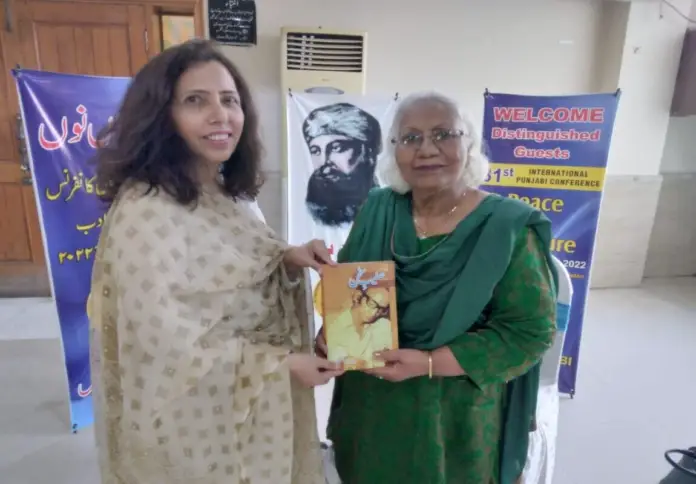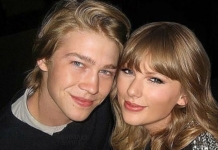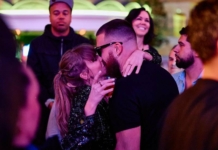Indian author Dr. Sultana Begum does not need an introduction when it comes to Punjabi literature. However, there is a large group of people which knows her as Amrinder Kaur. Dr. Sultana Begum AKA Amrinder Kaur retired from her service as a deputy director at Punjab Education School Board, Mohali in 2007 where she worked for almost thirty years, designing curriculum for Punjabi and Urdu textbooks in government schools.
Born in Patiala and still residing over there, Dr. Sultana Begum has eight books to her name, including one of ghazals as well, named ‘Ruswaiyaan’. Her other titles include ‘Gulzara’n’, ‘Bahara’n’, ‘Shagoofay’, Namak Paray’, ‘Qatra Qatra Zindagi’ and ‘Lahore Kinni Door’. She happens to be the first woman writer from Indian Punjab to bring a tinge of literariness in her Punjabi writings.
A few days back, she marked her presence at the International Punjabi Conference held in Lahore, where she expressed happiness at being invited and welcomed at such events taking place in Pakistan. “I always get emotional when I come here,” she said, adding that everything of Lahore attracts her towards itself, be it the outpour of love from Lahoris, Lahore’s culture, literature or art.
“It won’t be wrong to say that I half belong to this land, and half to the other side of the border,” Dr. Sultana Begum said while expressing her love for Pakistan, something which is also evident from the fact that she happens to be the first Muslim PhD scholar from Punjab University Chandigarh to write her dissertation on a Pakistani novel. Hailing from the department of Punjabi, she also did her Masters in the same language in 1974 from Patiala, and continued to attain education even after her marriage, completing a Masters in Urdu, a diploma in Persian and a PhD during her post-marriage years and also remaining associated with PU Chandigarh’s Theatre Department. Journalist Tamseela Chishti got in touch with the critically acclaimed author to have a conversation with her, which is as follows:
- What is the connection between Sultana Begum and Amrinder Kaur?
I got married in a Sikh family in 1975, and it was after my marriage that my in-laws named me Amrinder Kaur, which indeed has an interesting backstory. Forty-eight years ago, when my eldest daughter was born, my mother-in-law was there with me in the hospital. When the hospital admin asked my name, she mulled it over a bit and then asked them to write ‘Arminder Kaur’, thinking that they would find it weird that a daughter-in-law of a Sikh family was a Muslim. This is how I turned from Sultana Begum into Amrinder Kaur, despite Sultana Begum being my name on all official documents including my degrees and passport. It did cause a lot of problems for me later on though, especially when I had to go to Australia to meet my daughter back in 2004. I had to bring newspapers to prove it to them that I am both Sultana Begum and Amrinder Kaur, and then an entry of two names was made in my passport. Now, my complete name is Dr. Sultana Begum Amrinder Kaur.
- You remained associated with the field of education for long. How did you manage family life, children, a job and writing simultaneously?
I wrote all of my books after my retirement. It was in 2014 that my first book came into the market, and from then onwards, every year a book of mine would get published. Another book ‘Waseeyat Nama’ is also in the making which carries more than 70 essays based on me and my books. ‘Lahore Kinni Door’ and ‘Qatra Qatra Zindagi’ are my and my mother’s autobiographies, both of which got published in Shah Mukhi and were marketed in the latest International Punjabi Conference just held.
- Is there a special reason behind dedicating an entire book to the city of Lahore?
During the partition of the Subcontinent, my father shifted to Lahore. Earlier employed at Malwa Cinema in Patiala, he joined Ratan Cinema after coming to Lahore. Since both of these cinemas were under Seth Charan Das, he easily acquired the job and also invited my mother later on after buying a house in Anarkali Bazar. When my mother learnt that my father has married another woman here, she went back to Patiala, but unfortunately only to find out that her property had been allotted to Hindus who had migrated from Pakistan to India in the wake of partition riots. My mamoo, who she believed in was more focused on saving his life during those calamity-stricken times by hiding himself, and my mother was forced to provide for herself. She did a nursing course and acquired a job for herself.
- It is believed that the education system of Indian Punjab is quite good. Is it true?
Definitely! It is therefore that I have been able to do my Masters and Ph.D. Although a lot of private schools and convents have been built over there now, the quality of government schools persists. The girls are given free education and bicycles after eighth grade. Now, even BA education has been made free for girls and concessions are provided to mothers who wish to pursue their education.
- What do you think of the new government on the rise in Indian Punjab?
I am sure that the change will be for good, and being humans, we should always hope for the best as well. I pray that things turn out well for the people.
- What are your thoughts on Khalistan movement?
I am remotely related and equally remotely interested in it. I don’t have a very profound understanding of politics, the reason being my lack of interest in politics.








Comments are closed.